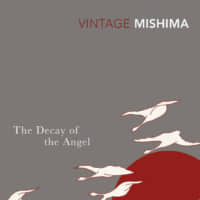"I don't like the weak and the sick sort of people that commit suicide," says a young man in Yukio Mishima's "The Decay of the Angel." "But there is one variety I accept. People who commit suicide to establish themselves."
The Decay of the Angel, by Yukio Mishima Translated by Edward Seidensticker.
256 pages
VINTAGE, Fiction.
First published in 1971, Mishima's final work is one of those famous books not many people have actually read. Its literary merit, at times debated, is overshadowed by the author's suicide just after the novel's completion, a shocking real-life exclamation mark that added to its mystique. With new Mishima oeuvre discovered this year, it is worth revisiting the last lines of a consummate artist, who ended the book knowing he would be dead by the time of its publication.
In poetic, often meditative prose — no other writer describes clouds and the sea quite like this — Mishima ends his "The Sea of Fertility" tetralogy with the same character, Shigekuni Honda, now a retired millionaire in his 70s. Honda adopts the young orphan Toru — "a hydrogen bomb equipped with consciousness" — seeing him as another reincarnation of his childhood friend Kiyoaki.
"The Decay of the Angel" is no cri de coeur, no angry testament to the world. Mishima calmly wraps up his themes — the shallowness of modern Japan, the loss of beauty and the emptiness of old age — aware that all time must run out.
The book ends serene, at a temple in Nara. "Who knows," Honda wonders at last, "perhaps there has been no I?" Then all is summer light in a garden, a stillness that has no memory.



